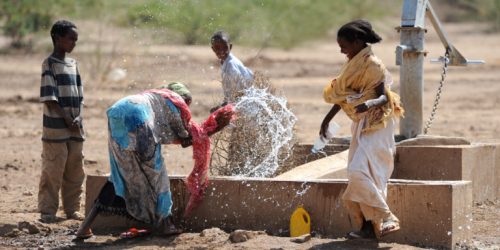Water and Sanitation
Community/School Led Total Sanitation

We launched the “When Kids Teach Kids Program” implemented in Public Elementary schools. Peer ambassadors are selected amongst school children who are trained and who in turn educate their peers and friends of different grades.
This program has proved very effective in communicating good hand hygiene behaviour in school children. Some of the ways we have made it fun, were by using cartoon stories, illustrations, video animations, games.
A lot of communities and schools in Nigeria, both urban and rural are burdened with Open defecation Practices. The health risks to this practice are enormous. And only very few villages in Nigeria have been certified open defecation free. In order to achieve this, the CLTS approach is adopted.
Community-Led Total Sanitation (CLTS) or SLTS is an approach which is based on the principle of triggering collective behaviour change. In this approach, rural communities are facilitated to take collective action to adopt safe and hygienic sanitation behaviour and guarantee that all households have access to safe sanitation facilities.

CLTS focuses on instigating a change in sanitation behaviour rather than constructing sanitation infrastructure. This change in sanitation behaviours is accomplished through a process of social awakening that is stimulated by facilitators from within or outside the community (see also awareness raising). The CLTS approach concentrates on the whole community rather than on individual behaviours. Collective benefit from stopping open defecation can encourage a more cooperative approach.
People decide together how they will generate a clean and hygienic environment that benefits everyone. It is essential that CLTS involves no individual household hardware subsidy and does not prescribe latrine models.
The CLTS approach concentrates on ending open defecation as a first significant step and entry point to changing behaviour. It starts by enabling people to do their own sanitation profile through appraisal, observation and analysis of their practices of open defecation and the effects these have.
In its fullest sense, total sanitation includes a range of behaviours such as: stopping all open defecation; ensuring that everyone uses a hygienic toilet; washing hands with soap before preparing food and eating, after using the toilet, and after contact with babies’ faeces, or birds and animals; handling food and water in a hygienic manner; and safe disposal of animal and domestic waste to create a clean and safe environment.
Related links
Water and Sanitation
School WASH Project
We discovered that 72 schools had neither running water nor a toilet facility.
Water and Sanitation
Plastic Exchange Project
This project aims to create an awareness to reduce the negative effect of plastic waste dumping in oceans and seas.
